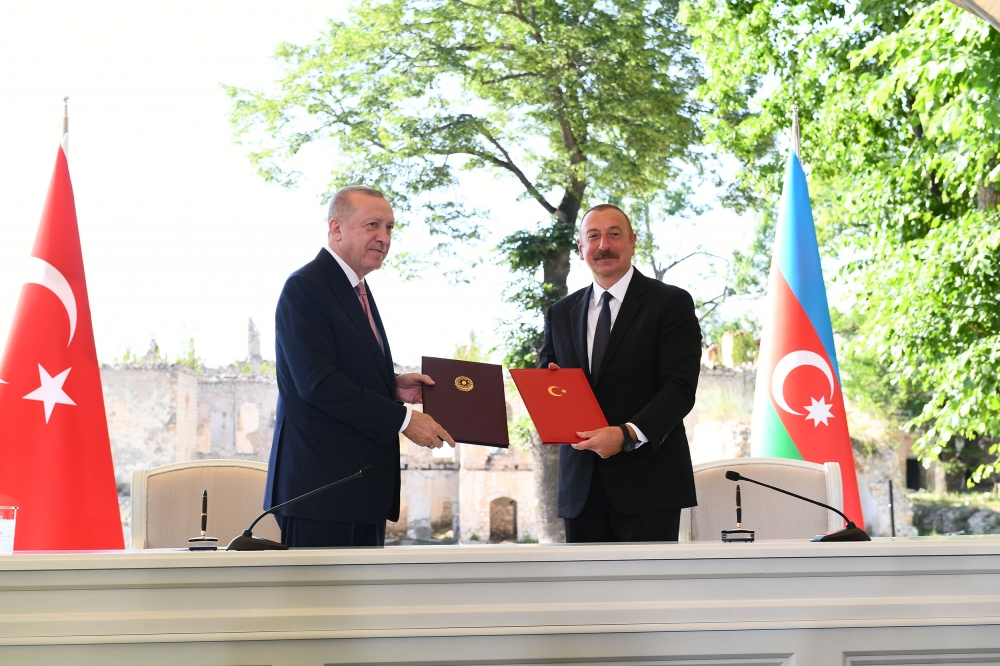Op-ed: How does Turkey-Azerbaijan military alliance fit into Russia's demands for NATO?
Azerbaijan and Russia-NATO tensions
With regard to the expansion of NATO’s influence to the east, Russia calls the post-Soviet space its “red line”. However, Azerbaijan is actively cooperating with Turkey, a NATO member, in the military field. Turkey and Azerbaijan created a military alliance, which is enshrined in the declaration signed in 2021 in Shusha (Shushi).
- A vicious circle in Azerbaijan: electoral violations and belated decisions of the ECHR
- CSTO Security Council meeting: threat to Kazakhstan or the CSTO?
According to the Shusha Declaration, signed on June 15, 2021, Azerbaijan and Turkey enter a military alliance. The document indicates the obligation of the parties of mutual military assistance in case of danger to sovereignty and territorial integrity.
In addition, Turkey and Azerbaijan are conducting planned joint military exercises on the territory of both countries. The said declaration does not exclude the establishment of Turkish military bases on the territory of Azerbaijan.
The Turkish army is the second most powerful army in NATO.
During the Geneva talks between Russia and NATO, Moscow put forward a demand for the alliance not to extend its influence over the post-Soviet space, including the countries of the Caucasus.
How can cooperation with a NATO member affect Azerbaijan’s relations with Russia? JAMnews addressed this question to the political observer Agshin Kerimov.
“Russia’s demands are a clear threat”
Since 1997, NATO has expanded its political geography in such a way that would have Russia surrounded in Eastern Europe.
Russia’s concern stems from the fact that NATO is practically ‘under its nose’, and the situation itself is developing according to the Cold War scenario.
The Ukrainian issue has brought the already turbulent, mutually zealous relationship to extreme escalation.
Since 2004, when the former Soviet republics of Latvia, Lithuania and Estonia became NATO members, enraged Russia has been rapidly expanding its military capabilities and has repeatedly conducted military maneuvers along its western borders.
But despite Russia’s strategic and military advantage over the Baltic states, the Kremlin will not succeed in subordinating them to its political will for the simple reason that even during the Soviet era, this region was distinguished by its aggressiveness towards Russia.
After the region came under NATO’s zone of influence, the expansion of the North Atlantic alliance to other post-Soviet countries became a “red line” for the Kremlin, and the question of Ukraine exacerbates the situation even more.
For the same reason, Russia cannot stomach Georgia’s aspirations to join NATO; Moscow’s rhetoric is not any softer on this issue either.
Russia demands from neighboring countries to clarify the boundaries of participation in NATO programs with integration into this Western alliance. This is an obvious threat.
“Russia is trying to pull Baku into its orbit”
As for Azerbaijan, Russia is trying to drag Baku into its orbit. Strategists of the Azerbaijani state understand the futility of this path, but are also trying to pursue a policy aimed at appeasing the Kremlin’s anger. Ultimately, this meets the interests of both the West and Moscow.
Despite the fact that our region is now going through a post-war period, the principle of balance in Azerbaijan’s foreign policy has not been significantly violated.
The West plays an important role in facilitating moments of Azerbaijan’s closeness to the Kremlin. During the second Karabakh war, Azerbaijan did not receive support from Western countries, with the exception of Great Britain. Baku predicted this in advance, and, therefore, took advantage of the tandem of Ankara and Moscow.
“Azerbaijan is Turkey’s “red line”
Naturally, the Kremlin’s warnings against NATO are also related to Azerbaijan, a country that has deepened cooperation with the North Atlantic alliance.
At the moment, the Azerbaijani government is acting very carefully. Despite all this, the presence of the Turkish factor plays an important role in repelling any aggression.
In this sense, the voicing of some open threats against Azerbaijan from Russia is associated with the factor of Turkey. The signing of the Shusha Declaration was an integral part of preventive measures, and it was very timely. This declaration itself is a continuation of the agreement signed between the two countries in 2010, and in fact can be called a document that creates new instruments for the post-war period.
In addition, Azerbaijan and Turkey periodically conduct joint military exercises, and the Azerbaijani army is increasing its power.
Perhaps the Kremlin has its own unspoken plans for Azerbaijan. But you shouldn’t take them seriously. Russia will not want to spoil relations with Turkey. And Azerbaijan is the same “red line” for Turkey.
The most effective instrument in the hands of Russia is the peacekeepers deployed on the territory of Azerbaijan, and in this matter Baku does not find adequate support from Ankara.
Despite all that has been said, Baku is convinced that Ankara, together with the Azerbaijani authorities, is trying to achieve the withdrawal of Russian peacekeepers from Karabakh.



















